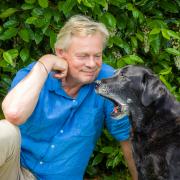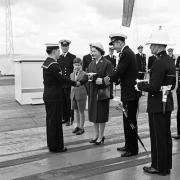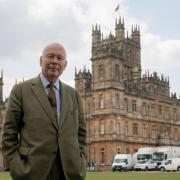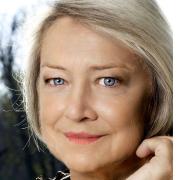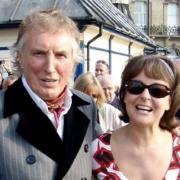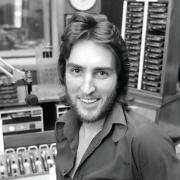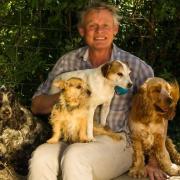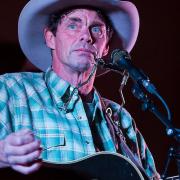Adam Lee-Potter talks to the mooted heir to Attenborough’s throne about his passion for wildlife
Chris Packham has, though he is far too self-critical to accept it, morphed into that elusive TV creature: a national treasure, the mooted heir to David Attenborough’s throne. From Springwatch to Autumnwatch – which he hosted from RSPB Arne at the end of October – he is universally cherished.
And that adoration clearly baffles Packham, who admits he has no close friends, professes to being closer to his dogs than to people and says bluntly: “I’m not being unkind, ungrateful or churlish, I just don’t see myself as successful. I’ve never really liked myself.”
He sees himself, instead, as “the Pol Pot of nature conservation”, a nod to his penchant for controversial comments such as when he suggested the giant panda was too expensive to save.
But he is, of course, doing himself a huge disservice. He is certainly outspoken but only in the way that a passionate, intelligent and scrupulously honest man can be. He can’t not tell the truth.
His raw autobiography, Fingers in the Sparkle Jar, was published this year. The memoir paints a picture of a lonely, isolated boy who found escape and solace in nature. Chris tells of his enduring battle with depression and how he twice contemplated suicide.
Eleven years ago, aged 44, after two years of therapy, he diagnosed himself with Asperger’s Syndrome. “It’s that,” he says, “that underlines all the other problems.”
Arguably, it is autism that has also made him such an accomplished conservationist: obsessed, perfectionist and candid. As he says: “There is no grey with me, only black or white.”
His was a difficult childhood, the “weird” kid at school who smelled of snakes and mice. By nine, he was sneaking out of the house to watch fox cubs.
He explains: “Engaging with other humans is hard for me. It takes an energy. With animals, I don’t have to try. Growing up, I had a very strong bond with my sister (Jenny Packham, the fashion designer). We are very close but there is a security in being on your own with nature.”
“My parents just thought I was obsessive, hard work and tiring. But my father, a marine engineer, has an enormous quest for knowledge, constantly reading. In some ways, I was the perfect child for him. We would go to museums and I would read every label.
“My mum was massively into literature and she took us to art galleries and to the opera. I have nothing but admiration for them.”
The word “admiration” jars a little.
“Love is a tough word for me,” admits Chris. It’s not a word I would use casually. I use it cautiously and pertinently. People have, in the past, used it flippantly with me and caused damage. Love is about commitment, trust, honesty and integrity – the most challenging things.
“Tolerance and flex don’t happen in my life.”
So does he love those closest to him – his parents, his sister, his partner Charlotte and his 21-year-old stepdaughter Megan?
Finally, after some thought, he says carefully: “I do love them yes, but in different ways.”
For a man in his 50s, there is still a hint of the old undergraduate: analysing, brooding, reflecting.
“I don’t see myself as controversial or outspoken,” he says, precisely. “I try to base my comment on good, sound facts. I’m not interested in people’s emotional response.”
Still, he has clearly learned to temper his bluntness. When I try to draw him on the Brexit vote, he says diplomatically: “I’m a zoologist, not a politician. I’m not going to tell you how to cook your dinner or grow your garden. If I wanted to know about cricket, I wouldn’t ask a footballer.”
After reading zoology at Southampton University, he trained as a wildlife cameraman before landing the plum job as a co-presenter of the children’s TV nature programme, The Really Wild Show. Punkishly photogenic, outwardly confident and informed, he was an immediate hit.
His fellow presenter, Nicola Davies, said later: “Chris was fabulous and beautiful and super, super-confident. He was super-ambitious and incredibly sensible because he realised something I didn’t – you have to make sure you promote yourself.”
Chris, naturally, has a rather different take.
“I think people can confuse ambition with drive. I’m not ambitious, I’ve never had targets. But I am driven – I want to make things better. As for confidence, that’s not it either. It’s just that I’ve never cared what people think of me. It’s not the same thing.”
BBC Autumnwatch is, of course, an institution and Packham is its perfect ambassador.
“RSPB Arne is a fabulous place with a great range of habitat and autumn is a fascinating time for us to film.
“It’s a great transition, with tremendous energy being moved around the planet. Migratory birds are leaving us but the last swallows and house martins are still here. Waterfowl are starting to arrive. Poole Harbour is an absolute hot spot. We’re going to be focussing on the spoonbills that roost in RSPB Arne. We’ve set up a dummy bird so hopefully we’ll be able to film them from just centimetres away. It’s all very exciting.”
Packham, a keen music fan, is known for inserting song titles into the series, from Madness to Bowie. What can we expect this year?
“They need to be songs that everyone will know and my taste is a little obscure. How about Billy Bragg? His politics are in the right place and he lives up the road. I might try and slot in The Milkman of Human Kindness.”
As untouched as RSPB Arne is – as showcased on screen – our environment is very much under threat.
“We are winning battles but we are losing the war. All of our habitats are in decline and we have difficult challenges ahead.
“But as a species, we are adaptable, intelligent and resourceful. I’m not saying it will be pretty but I think we will turn things around. We’re too smart to fail. The elephant in the room remains the increasing human population.
“We need some form of population control that needs to be measured and understood and implemented in a passive and fair way.”
Chris once said: “I do not now – and never have had – any desire whatsoever to reproduce myself.” His close relationship with stepdaughter Megan has only cemented that view. As ever, it is a reasoned one.
“To have children, you have to like yourself and I don’t. And children are inheriting a poorer planet – because of us. I feel embarrassed that the world I’m handing to Megan has not improved.
“So I don’t want children, no. Megan has more than fulfilled any gap. I’ve taken enormous pleasure in trying to help and guide her. We enjoy each other’s company.”
Megan’s chosen career path – she is reading zoology at Liverpool University – is surely a vindication? “I didn’t push her but I have an admiration for what she’s doing – it gives me security.”
That word “security” again.
Chris first contemplated suicide in 2003. He had just split up with Jo, Megan’s mother, and his pet dog had died. He only stood back from the brink because he realised didn’t have enough pills to do the job.
Later, his devotion to his two new poodles stopped him: “They loved me so I couldn’t do it. They kept me alive.”
Itchy and Scratchy are 13 now. Does he worry about the possible consequences of their inevitable death?
“Depression is always there, over my shoulder. My dogs have still got some life left but I do worry about the immense loneliness that will come when I lose them. For me, that will be a dangerous place.”
Chris cannot be easy to live with. He jokes that his 38-year-old partner Charlotte – a fellow animal lover who owns the Isle of Wight Zoo – is writing her own book in response to his autobiography, called “Living with someone with Asperger’s.” He adds: “I’m very lucky to have found someone who tolerates and puts up with me.”
Challenging, certainly. Boring, never. And that dichotomy pretty much sums the man up.
Chris Packham’s Dorset
• Corfe Castle: I spent an afternoon there with an old girlfriend and it’s the most romantic spot. The Purbeck coast is dazzling: dolphins, peregrines and seabirds. There are horseshoe bats at Winspit and Dancing Ledge and the area round Agglestone Rock, near Studland, is good for Dartford warblers and smooth snakes.
• Moreton: I am fascinated by T. E. Lawrence. He was accepting of the fact we are shaped by the environment and he was also a rebel. I love the church and his old house, Cloud’s Hill. The effigy of him at St Martin’s in Wareham is beautiful.
• RSPB Arne: The road into RSPB Arne, out across the heath, is one of the best drives on the planet. We mustn’t allow familiarity to breed contempt. Just because you’ve driven it before doesn’t make it any less special. You’ve got to keep opening your eyes and soak it all up. Set your alarm clock this autumn and count every rainbow, every full moon. Life is not limitless.
• Poole Harbour: There is no better place to see avocets than on this gorgeous sheet of water.
• Bournemouth Natural Science Society: I am patron of this lovely old-fashioned museum on Christchurch Road – they’ve got everything. You could go in there and not come out for a year. If you see just one thing there then it’s the Pitt Rivers collection. General Pitt Rivers was a 19th century archaeologist who dug up a lot in Dorset. Captivating.




